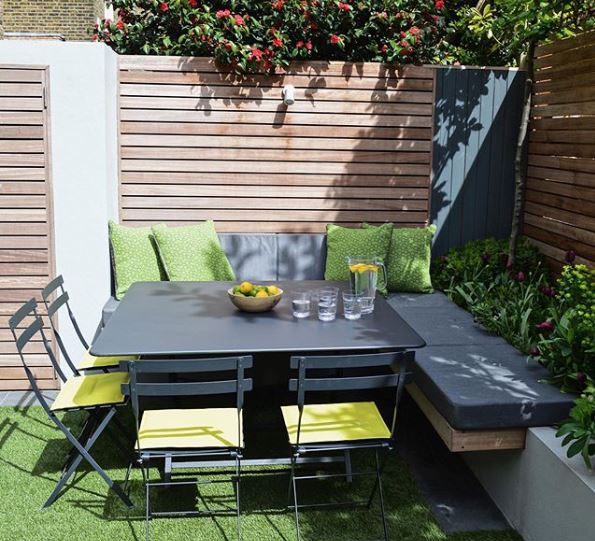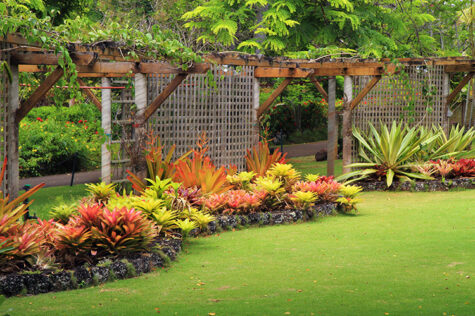The most wonderful thing about having a garden is that you have your own little slice of nature to escape into whenever the mood (or, let’s face it, the weather) takes you. Being able to remove yourself from the sights, smells and sounds of the rest of the world makes it much easier to de-stress and unwind.
However, as nice as this idea is, unless you live somewhere nice and rural, it can be tricky to close yourself off properly.
Most of us are overlooked by one – if not several – neighbouring homes, and are surrounded by other gardens, public paths and roads. You can close your eyes to avoid the view, but it’s tricky to close your ears and drown out the sounds.
Living in a city (albeit a small one), this issue is pretty close to my heart.
So, today, we’ll be looking at ways to block out some of that ambient noise – specifically, how to reduce traffic noise in your garden.
These tips should also muffle other background noise, like pedestrians, trains or people a few gardens over. Unfortunately, I don’t have a solution for drowning out next door’s Karen and Richard bickering over the BBQ (yet).
How Does Noise Reduction Work?
There are two ways to reduce noise in any environment, and getting your head around the principles will make it easier to make sound-blocking decisions in your landscaping.
Sound deflection (blocking sound)
The first is sound deflection. Sound deflection uses a hard barrier (like a solid wall) to bounce soundwaves back in the direction they came from. If you place a sound-deflecting barrier between you and the source of the noise, less of those soundwaves will reach you.
Sound deflection improves as the barrier gets taller and denser. For example, a chain-link fence or low wooden panels won’t block that much noise. However, a tall wall made from brick or stone will deflect much more sound (again, providing that it’s between you and the source of the noise).
Sound-deflection is a really good way to bring some tranquility to your space… but, as you can imagine, building a thick, tall wall around your garden will have other drawbacks. It’s expensive, for one, and it’ll reduce your light and view even better than it will cut the ambient noise.
Sound attenuation (absorbing sound)
The other method that will reduce traffic noise in your garden is sound attenuation. Instead of trying to bounce soundwaves away from your garden, sound attenuation is about absorbing sound energy to reduce noise before it reaches you.
Like sound deflection, this technique relies on barriers between your ears and whatever is making the noise you want to avoid. However, sound-absorbing barriers are usually looser and softer – like hedges, or structured foam (I’ll explain better in a moment).
Trying to attenuate, or absorb, the sound isn’t quite as effective as sound deflection. However, this method is generally cheaper and much more attractive in terms of your garden aesthetic.
Choosing Fences, Walls and Screens to Reduce Traffic Noise
Okay, so the best way to reduce traffic noise in your garden is going to be fencing – including walls and screens. If you’ve already seen our post on garden fence ideas, you might already be picturing the type of fence that will look best with your garden. However, if your priority is to make your garden quieter, you’ll need to factor in more than just its visual appeal.
Tall fencing
The majority of annoying noises (cars, dogs, children, lawnmowers etc.) will be coming from somewhere between the ground and knee-height. So, a little extra height goes a long way when it comes to minimising noise coming into your garden – both in terms of deflecting and absorbing the sound.
A two-metre fence is ideal. Technically, any taller requires planning permission… but you could add a trellis to the top for additional height, and grow flowers across it for better sound absorption.
Thick fencing
Like I’ve mentioned, a dense barrier does a better job of deflecting sound. Even a wooden fence is too thin and flexible to really act as a barrier to noise. You want something solid and thick – like a brick wall or stone wall – to really keep the sound out.
Solid fencing
By now it’s probably obvious that a fence with gaps in it is going to do a poor job of cutting down ambient noise. The sound will carry right through the cracks or gaps, almost as if there’s no fence at all. Picket fences and decorative panels look pretty, but won’t do much to reduce traffic noise, dog yaps or your neighbour’s banging tunes.
Fencing locations
The closer your fence is to the source of the noise, the better job it can do at dampening that noise as soon as possible. That’s why putting a tall, solid barrier around the edge of your garden is really the most effective way to start.
If there’s an area of your garden that you would appreciate being particularly quiet – like a spot for reading, exercising or sunbathing – then you might want to add an additional barrier. Something like a privacy screen, trellis or pergola (especially with plants growing over it) will give you extra cushioning from noise.
Outdoor workspaces like garden offices should definitely have more than one layer of noise defense. For example, I would suggest adding insulation to the walls of the workspace, as well as surrounding it with tall plants, inside a high-fenced garden.
What Fence Materials Will Reduce Traffic Noise the Most?
So you’re back at square one of choosing your fence. What materials should you be considering if you’re really sick of hearing vehicles when you’re outdoors?
Masonry

A wall built from brick or stone is going to do an excellent job of keeping the outside, well, out. The solid structure of masonry means it’s great for sound deflection, and the thickness of a wall (rather than a fence) means that it’s going to attenuate some of the noise too.
Stone or brick walls aren’t exactly cheap though. Look for reclaimed materials to keep your costs down. The patina of weathered rock or old bricks can add a lot of valuable character and charm to a garden, whether you like a vintage look or want some contrast to a modern, minimalist space.
Don’t forget to check your local planning rules before you start building, too. Even if you’re finding the noise pollution unbearable, having to tear down a wall that you’ve only just built will be a headache you absolutely don’t need.
Acoustic fences
Acoustic fencing is actually designed to block noise coming into your garden. An acoustic fence is usually made from a combination of sound deflective and sound attenuating materials, like acoustic wool encased in closely-panelled wood.
These solutions are usually pretty attractive, and somewhat cheaper than building a wall. However, they’re still going to be a bit of an investment compared to other options.
Plant walls

Vegetation is actually really good at blocking out noise (and pollution) from nearby traffic. Dense shrubbery and hedges look really attractive as garden fences, plus your local wildlife will be grateful!
Look for fast-growing plants, like conifer trees, leylandii or laurel hedges, or even closely-packed bamboo. These can be grown in dense clumps to provide a beautiful green wall that keeps your garden quiet, private and tranquil.
Plus, as the wind brushes through their leaves and branches, the gentle rustle will act as white noise over the sound of distant (or maybe not-so distant) roads.
You should also check out green walls, which can be cultivated to add a bit of extra sound absorption in your garden. There are different kinds of green wall setups, so you should be able to find one with the plants and structure to suit your home, fence or garden shed.
Wooden fencing

Wooden fences are easy and less expensive to install, and depending on the thickness can provide some level of noise reduction.
However, they’re not as effective as other methods and are prone to rot.
Metallic panels
Metallic panel barriers are the least effective, as the panels can actually vibrate and magnify sound waves.
They are easy and inexpensive to install, though, and can provide a very minimal level of sound deflection.
Water features
Although not a physical barrier, running water features such as fountains, streams, or a pond with a waterfall can create their own gentle sound that can help to drown out unpleasant noise.
Reducing road noise in the garden can be stylish
There are plenty of options for reducing noise pollution in your backyard, so you’ll have to carefully decide which one will work best with your garden layout and overall budget.
While tall and dense structures make the best barriers, there are less expensive and intrusive options you can consider as well to help restore the serenity of your backyard.

Save this pin for later











